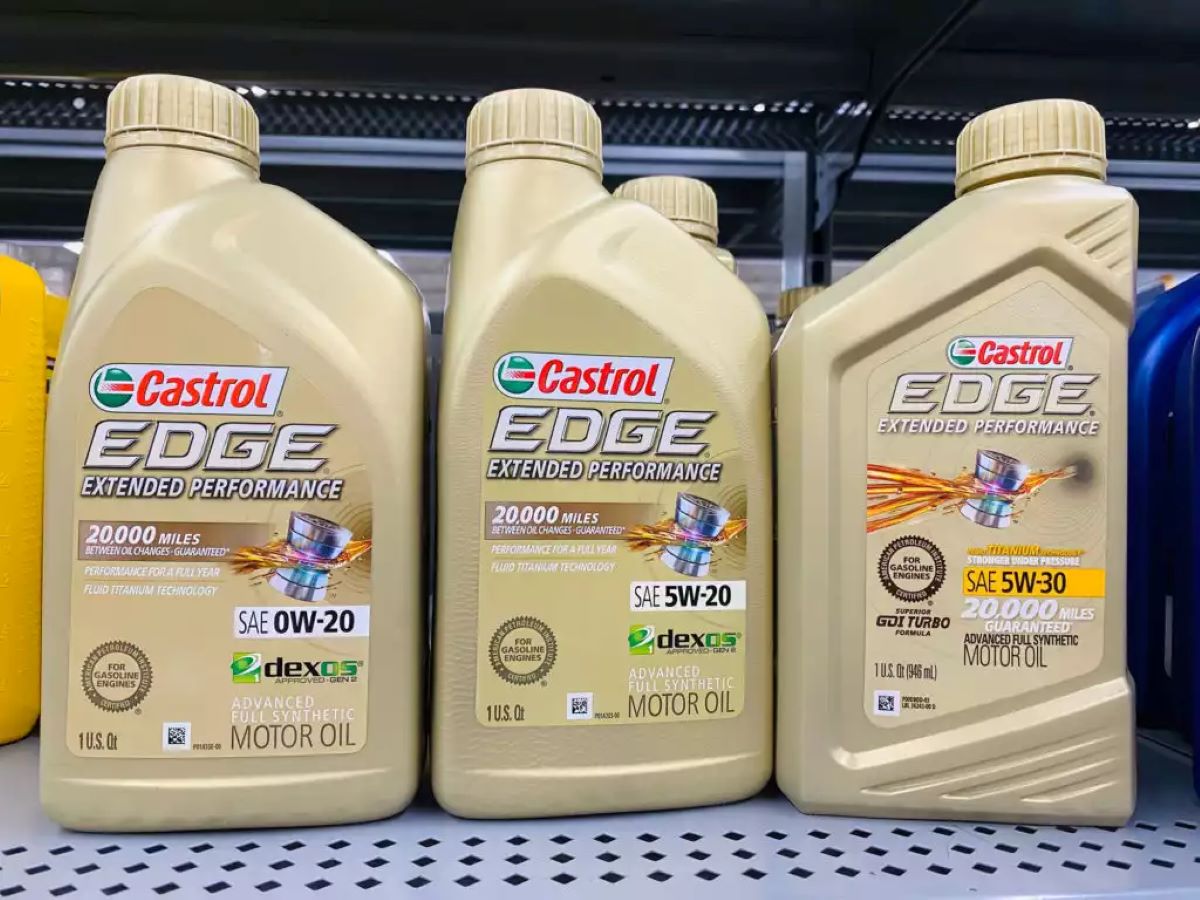

Articles
How To Store Motor Oil
Modified: August 17, 2024
Discover the best practices for storing motor oil with our comprehensive articles. Keep your oil in top condition for optimal engine performance.
(Many of the links in this article redirect to a specific reviewed product. Your purchase of these products through affiliate links helps to generate commission for Storables.com, at no extra cost. Learn more)
Introduction
Motor oil is an essential component of any vehicle’s engine. It lubricates the moving parts, reduces friction, and helps maintain optimal engine performance. However, many car owners overlook the importance of properly storing motor oil. Whether you are a DIY enthusiast or a professional mechanic, understanding how to store motor oil correctly is crucial for maintaining its quality and effectiveness.
In this article, we will explore the reasons why proper motor oil storage is essential and provide valuable tips on storing motor oil safely and efficiently.
Key Takeaways:
- Properly storing motor oil preserves its quality, prevents contamination, and extends its shelf life, ensuring optimal engine performance and saving money on potential repairs.
- Safely storing and disposing of motor oil protects the environment, prevents pollution, and contributes to the sustainability of natural resources through recycling initiatives.
Read more: How To Oil An Electric Motor
Why Proper Storage of Motor Oil is Important
Proper storage of motor oil is vital for maintaining its quality and ensuring its effectiveness when it comes time to use it in your vehicle. Here are some key reasons why proper storage of motor oil is important:
1. Preserves Oil Quality: Motor oil can degrade over time if not stored properly. Exposure to sunlight, extreme temperatures, and moisture can cause the oil to break down and lose its lubricating properties. By storing motor oil in a controlled environment, you can help preserve its quality and ensure its performance when needed.
2. Prevents Contamination: Motor oil can easily become contaminated if it comes into contact with dirt, dust, or other substances. Contaminated oil can cause damage to your engine and reduce its efficiency. Proper storage helps to keep the oil clean and free from any contaminants, ensuring its effectiveness when used in your vehicle.
3. Extends Shelf Life: Motor oil has a shelf life, and storing it correctly can help extend its longevity. By keeping the oil in a cool and dry place away from direct sunlight, you can slow down the oxidation process and maintain its quality for a more extended period.
4. Saves Money: Properly storing motor oil can save you money in the long run. When oil degrades due to poor storage conditions, it may not provide the necessary lubrication and protection to your engine, leading to potential damage or decreased fuel efficiency. By ensuring the oil remains in optimal condition, you can avoid costly repairs and maintain your vehicle’s performance.
5. Safety Precaution: Motor oil is flammable, and improper storage can pose a safety risk. Storing oil in non-approved containers or in areas with high temperatures or open flames can increase the chances of accidents or fire. By following proper storage guidelines, you can reduce the risk of accidents and ensure the safety of yourself and others.
By understanding the importance of proper motor oil storage, you can ensure that the oil remains in optimal condition and ready to deliver optimal performance when it is time to use it in your vehicle.
Choosing the Right Container for Motor Oil Storage
When it comes to storing motor oil, selecting the right container is crucial. The container should be durable, leak-proof, and resistant to the elements. Here are some factors to consider when choosing a container for motor oil storage:
1. Material: Opt for containers made of high-density polyethylene (HDPE) plastic or metal, such as steel or aluminum. These materials are sturdy and can effectively protect the oil from sunlight, oxygen, and moisture. Avoid using containers made of low-quality plastic or glass, as they may not provide adequate protection against degradation.
2. Capacity: Consider the amount of motor oil you will be storing. Select a container with a capacity that can accommodate your needs. It is recommended to choose containers that are slightly larger than the amount of oil you intend to store to allow for expansion and to prevent overfilling.
3. Sealability: Ensure that the container has a secure and leak-proof seal. This will help prevent any oil leakage and keep contaminants out. Look for containers with a tight-fitting cap or lid that can be securely fastened.
4. Visibility: It is helpful to choose a container that is translucent or transparent. This allows you to easily monitor the oil level and check for any signs of contamination, such as water or debris, without the need to open the container.
5. Labeling: Select containers that have the ability to be easily labeled. Properly labeling the container with the type of oil, date of purchase, and other important information can help you keep track of the oil’s age and ensure you use the oldest oil first.
6. Secondary Containment: Consider the need for secondary containment, especially if storing a large amount of motor oil. In the event of a leak or spill, a secondary containment system, such as a spill tray or secondary containment drum, can prevent the spread of oil and minimize environmental damage.
7. Compliance with Regulations: Ensure that the container meets all local regulations and guidelines for storing motor oil. Different regions may have specific requirements, such as the need for child-resistant closures or specific labeling information. Always adhere to the applicable regulations to ensure compliance and safety.
Remember, the container you choose for storing motor oil plays a vital role in preserving the oil’s quality and protecting both your vehicle’s engine and the environment. Take the time to carefully select a suitable container that meets your needs and provides the necessary protection for the oil.
Selecting the Ideal Location for Storing Motor Oil
The location where you store motor oil is just as important as the container you choose. The right storage location can help ensure the oil remains in optimal condition and is readily accessible when needed. Consider the following factors when selecting the ideal location for storing motor oil:
1. Cool and Dry Environment: It is crucial to store motor oil in a cool and dry environment. Avoid areas that are exposed to direct sunlight or extreme temperature fluctuations, as these conditions can accelerate the degradation process. Opt for a storage space, such as a garage or basement, that maintains a consistent temperature and humidity level.
2. Well-Ventilated Area: While it is important to keep the oil in a cool environment, ensure that the storage location is also well-ventilated. Adequate ventilation prevents the accumulation of fumes that may be released by the oil, reducing the risk of flammability and maintaining a safe storage environment.
3. Elevated Storage: Whenever possible, store motor oil containers on shelves or elevated surfaces. By keeping the oil off the ground, you can prevent potential damage from moisture or spills. Additionally, elevated storage can also help improve visibility and accessibility to the oil.
4. Away from Heat Sources: Avoid storing motor oil near heat sources such as heaters, furnaces, or electrical equipment. High temperatures can cause the oil to degrade or even ignite. Ensure there is a safe distance between the oil and any potential heat sources to minimize the risk of fire or damage to the oil containers.
5. Separate from Food and Beverages: To prevent cross-contamination, it is essential to store motor oil away from food, beverages, and any items intended for human consumption. Accidental spills or leaks can contaminate the food or beverages, posing serious health risks.
6. Accessible and Well-Organized: Arrange the motor oil containers in a well-organized manner to facilitate easy access. Store them in a visible and easily accessible location, ensuring that the oldest oil is used first to prevent expiration. You may consider using a shelving system or labeled bins to keep the storage area tidy and prevent any confusion.
7. Follow Local Regulations: Ensure compliance with local regulations and guidelines when selecting a storage location for motor oil. Some regions may have specific requirements regarding the storage of hazardous materials, including motor oil. Always check and adhere to the local regulations to maintain a safe and legal storage environment.
By selecting an ideal storage location for storing motor oil, you can help prolong its shelf life, maintain its quality, and ensure that it remains ready for use whenever you need it.
Store motor oil in a cool, dry place away from direct sunlight and extreme temperatures. Make sure the containers are tightly sealed to prevent contamination.
Tips for Safely Storing Motor Oil
Proper storage of motor oil is not only important for preserving its quality but also for ensuring safety in handling and usage. Here are some essential tips to follow when it comes to safely storing motor oil:
1. Keep Original Containers: It is best to store motor oil in its original sealed container. The original containers are designed to withstand oil storage and are often made of materials that help prevent contamination and degradation. If you need to transfer the oil to a different container, ensure that the new container is clean, labeled properly, and meets all safety requirements.
2. Do Not Mix Different Oil Types: Avoid mixing different types of motor oil together. Each type of oil is formulated differently and using a mixture of oils can affect its performance and potentially harm your vehicle’s engine. Always store different oil types separately to prevent any accidental mixing.
3. Secure Cap or Lid: Ensure that the cap or lid of the motor oil container is tightly sealed to prevent any leakage or spills. This will also help maintain the oil’s quality and prevent any contaminants from entering the container.
4. Store Away from Flames or Ignition Sources: Motor oil is flammable, so it is crucial to store it away from any potential ignition sources like open flames, heaters, or electrical equipment. Even a slight spark can ignite the oil, leading to a serious fire hazard.
5. Store in a Well-Ventilated Area: While a cool environment is important for motor oil storage, it is equally vital to keep the storage area well-ventilated. Proper ventilation helps to dissipate any fumes that may be released by the oil, minimizing the risk of flammability.
6. Use Spill Trays or Absorbent Materials: Consider using spill trays or absorbent materials, such as absorbent pads or granules, beneath the motor oil containers. These can help contain any potential spills or leaks, preventing them from spreading and minimizing the risk of contamination or slipping hazards.
7. Regularly Inspect Containers: Regularly inspect the motor oil containers for any signs of damage or leaks. If you notice any cracks, punctures, or other issues, transfer the oil to a new, intact container. It is also important to check the expiration date of the oil and discard any oil that has expired or is no longer suitable for use.
8. Dispose of Used Oil Properly: When it comes time to dispose of used motor oil, be sure to follow proper disposal guidelines. Many communities have designated collection points or recycling centers where you can safely dispose of used oil. Never pour used oil down drains, toilets, or onto the ground, as it can contaminate water sources and harm the environment.
By following these tips, you can ensure the safe and proper storage of motor oil, protecting both yourself and the environment.
Read more: How To Get Motor Oil Out Of A Carpet
Proper Disposal of Used Motor Oil
Disposing of used motor oil improperly can have harmful effects on the environment and pose health risks. It is important to follow the proper guidelines for the disposal of used motor oil. Here are some essential steps to ensure the proper disposal of used motor oil:
1. Collect the Used Oil: Begin by collecting the used motor oil in a clean and leak-proof container, such as the original container or a specifically designated oil collection container. Ensure that the container is properly sealed to prevent any leaks during transportation.
2. Do Not Mix with Other Substances: It is crucial to keep used motor oil separate from other substances, such as antifreeze or gasoline. Mixing different substances can contaminate the oil and make it more challenging to recycle or dispose of properly.
3. Find a Recycling Center or Collection Facility: Research and locate a local recycling center or collection facility that accepts used motor oil. Many automotive service stations, local government facilities, and specialized recycling centers provide oil collection services. Check with your local municipality or waste management authority for information on approved drop-off locations.
4. Follow Local Guidelines: Ensure you are familiar with and follow the specific guidelines and regulations for used oil disposal in your area. Some regions may have specific requirements for the type of containers used, the quantity of oil accepted, or the method of transport. Adhering to these guidelines helps maintain environmental and legal compliance.
5. Transport the Oil Safely: When transporting the used motor oil to the collection facility, take precautions to prevent spills or leaks. Place the sealed container in a sturdy, leak-proof bag or box to minimize the risk of any mishaps during transit. Avoid transporting the oil in the passenger compartment of your vehicle to prevent potential contamination.
6. Reuse or Recycle: At the collection facility, the used motor oil will either be reused or recycled. Reused oil goes through a filtration and re-refining process to remove impurities and contaminants, making it suitable for further use. Recycled oil is processed to produce other petroleum-based products. Recycling used oil is an environmentally-friendly option and helps conserve natural resources.
7. Dispose of Empty Oil Containers Properly: Empty containers that previously held motor oil should be rinsed thoroughly and disposed of according to local waste management guidelines. These containers may be recyclable, so check if they can be included in your regular recycling program.
8. Avoid Improper Disposal Methods: Never dispose of used motor oil by pouring it down drains, toilets, into the ground, or onto the street. Improper disposal pollutes water sources, contaminates soil, harms wildlife, and poses risks to human health. It is important to take responsibility for your used motor oil and dispose of it in an environmentally-friendly manner.
By following these steps and taking the time to properly dispose of used motor oil, you contribute to protecting the environment and ensuring the sustainability of our resources. Together, we can make a significant impact on preserving our planet’s health.
Conclusion
Properly storing motor oil is essential for maintaining its quality, ensuring its effectiveness, and promoting safety. By following the guidelines outlined in this article, you can safeguard your investment in motor oil and protect both your vehicle and the environment. Remember these key takeaways:
– Preserving oil quality by storing it in a controlled environment away from sunlight, extreme temperatures, and moisture helps maintain its lubricating properties and extends its shelf life.
– Choosing the right container made of durable material, with a secure seal, and proper labeling, ensures the oil remains protected from contaminants and enables easy monitoring of its level and expiration date.
– Selecting an ideal storage location that is cool, dry, well-ventilated, and away from heat sources, ensures the oil’s integrity, minimizes the risk of fire hazards, and prevents cross-contamination with food and beverages.
– Safely storing motor oil involves handling it with care, using spill trays or absorbent materials, regularly inspecting containers for damage, and adhering to local regulations for disposal.
By following the proper storage and disposal practices, you not only ensure the longevity and effectiveness of your motor oil but also contribute to a safer and cleaner environment. Proper storage and disposal of used motor oil help prevent contamination of water sources, reduce pollution, and conserve natural resources through recycling initiatives.
Take the responsibility to store and dispose of motor oil correctly. By doing so, you contribute to maintaining your vehicle’s performance, prolonging the life of the engine, and minimizing the impact of used oil on the planet. Let’s prioritize the proper storage and disposal of motor oil, reflecting our commitment to sustainability and a greener future.
Frequently Asked Questions about How To Store Motor Oil
Was this page helpful?
At Storables.com, we guarantee accurate and reliable information. Our content, validated by Expert Board Contributors, is crafted following stringent Editorial Policies. We're committed to providing you with well-researched, expert-backed insights for all your informational needs.















0 thoughts on “How To Store Motor Oil”